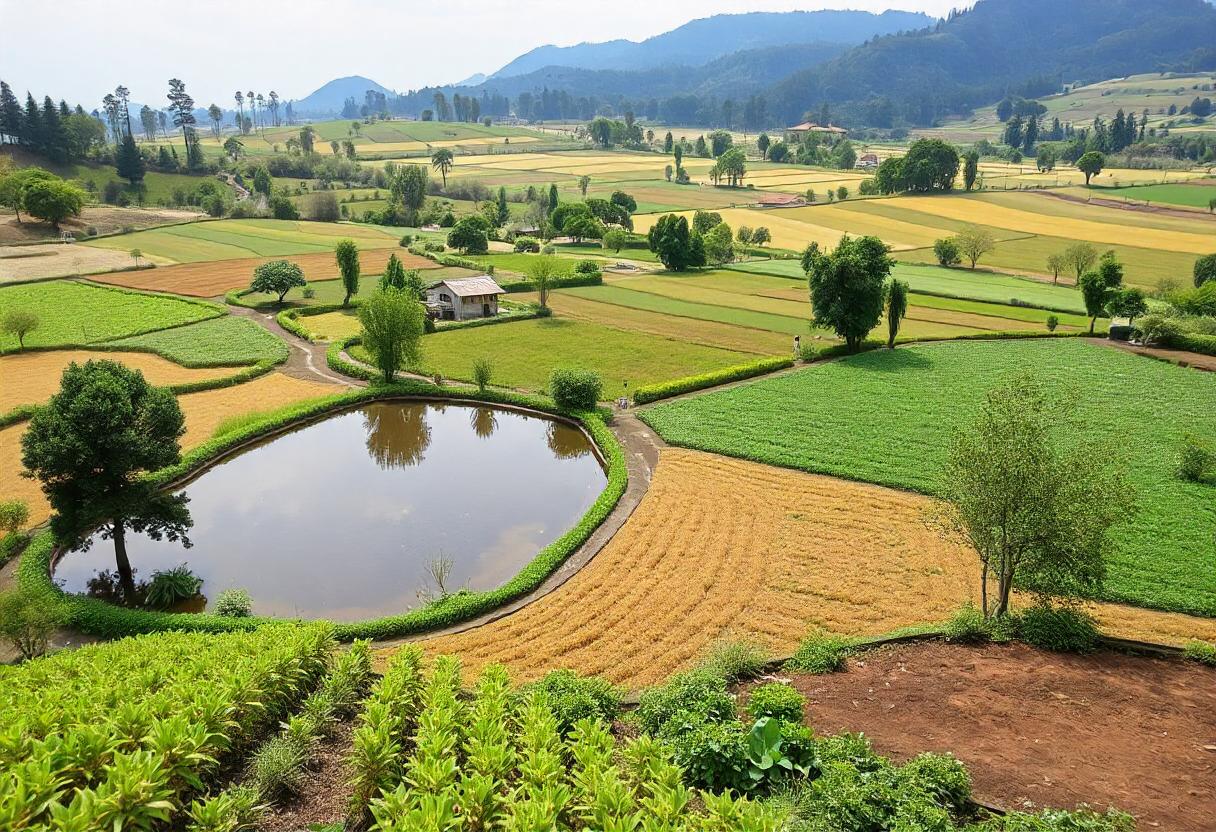
The relationship between agriculture, ecosystems, and the environment is complex and critical for sustainable development. Agriculture, as a major land use, has significant impacts on ecosystems and the environment. Conversely, the health of ecosystems and the environment influences agricultural productivity and sustainability. Understanding and managing these interactions are key to promoting both agricultural productivity and environmental stewardship.
Impact of Agriculture on Ecosystems
Agriculture significantly affects ecosystems in various ways:
1. Land Use Change
- Deforestation and Habitat Loss: The expansion of agricultural land often leads to deforestation and loss of natural habitats. This can result in reduced biodiversity and disruption of ecosystems.
- Soil Degradation: Intensive farming practices can lead to soil erosion, nutrient depletion, and reduced soil fertility. This degradation impacts land productivity and increases the need for chemical inputs.
2. Water Use and Pollution
- Irrigation: Agricultural irrigation can deplete water resources, alter natural water cycles, and impact wetlands and river systems. Over-extraction of water can lead to the depletion of aquifers and reduced stream flow.
- Nutrient Runoff: The use of fertilizers and manure can result in nutrient runoff into water bodies, leading to eutrophication. This process causes excessive growth of algae and aquatic plants, which can deplete oxygen levels and harm aquatic life.
3. Pesticides and Chemicals
- Chemical Pollution: Pesticides and herbicides used in agriculture can contaminate soil and water, affecting non-target species and ecosystems. These chemicals can disrupt the health of wildlife and beneficial insects, such as pollinators.
- Resistance Issues: Overuse of pesticides can lead to the development of resistant pest populations, requiring even more chemicals and potentially harming the ecosystem further.
Environmental Impacts of Agricultural Practices
Agricultural practices can have various environmental impacts:
1. Greenhouse Gas Emissions
- Methane and Nitrous Oxide: Livestock production and the use of synthetic fertilizers contribute to the emission of greenhouse gases like methane and nitrous oxide. These gases contribute to global warming and climate change.
- Carbon Sequestration: Conversely, sustainable agricultural practices such as agroforestry and conservation tillage can enhance carbon sequestration in soils and reduce greenhouse gas emissions.
2. Biodiversity Loss
- Monocultures: The cultivation of single crop species over large areas (monocultures) can reduce habitat diversity and threaten species that rely on varied ecosystems.
- Species Extinction: Habitat destruction and pollution can lead to declines in plant and animal species, disrupting ecological balance and reducing biodiversity.
Sustainable Agricultural Practices
To mitigate the negative impacts of agriculture on ecosystems and the environment, various sustainable practices can be adopted:
1. Conservation Tillage
- Reduced Soil Disturbance: Conservation tillage practices minimize soil disturbance, which helps prevent erosion, improves soil health, and retains moisture.
- Cover Crops: Planting cover crops helps protect soil, reduce erosion, and enhance soil fertility by adding organic matter.
2. Integrated Pest Management (IPM)
- Reduced Chemical Use: IPM combines biological, cultural, and mechanical control methods with minimal chemical use to manage pests. This approach reduces reliance on pesticides and minimizes environmental impact.
- Pest Monitoring: Regular monitoring of pest populations and environmental conditions helps optimize pest control and reduce unnecessary chemical applications.
3. Agroforestry and Agroecology
- Agroforestry: Integrating trees and shrubs into agricultural landscapes provides multiple benefits, such as improving soil health, enhancing biodiversity, and reducing erosion.
- Agroecology: This holistic approach to farming emphasizes ecological principles, such as enhancing soil health, promoting biodiversity, and using natural processes to manage pests and nutrients.
4. Water Management
- Efficient Irrigation: Adopting efficient irrigation techniques, such as drip irrigation and rainwater harvesting, helps conserve water and reduce the impact on aquatic ecosystems.
- Buffer Zones: Establishing vegetated buffer zones around water bodies can help filter runoff, reduce nutrient and pesticide pollution, and protect aquatic habitats.
Ecosystem Services and Agriculture
Agriculture benefits from and contributes to ecosystem services, which are vital for maintaining environmental health and supporting agricultural productivity:
1. Pollination
- Wild Pollinators: Healthy ecosystems support a diverse range of pollinators, such as bees and butterflies, which are essential for the pollination of many crops.
- Pollinator Habitat: Protecting and restoring natural habitats can support pollinator populations and improve crop yields.
2. Soil Health
- Nutrient Cycling: Healthy ecosystems facilitate nutrient cycling, which is essential for maintaining soil fertility and supporting crop growth.
- Organic Matter: Incorporating organic matter into soils helps improve soil structure, water retention, and nutrient availability.
3. Climate Regulation
- Carbon Storage: Ecosystems such as forests and wetlands act as carbon sinks, sequestering carbon dioxide from the atmosphere and mitigating climate change.
- Temperature Regulation: Natural landscapes can moderate local temperatures and contribute to climate stability.
The interplay between agriculture, ecosystems, and the environment is complex, requiring a balanced approach to ensure that agricultural practices support both productivity and sustainability. By adopting sustainable practices and fostering a deeper understanding of these relationships, we can work towards a future where agriculture and environmental stewardship go hand in hand.